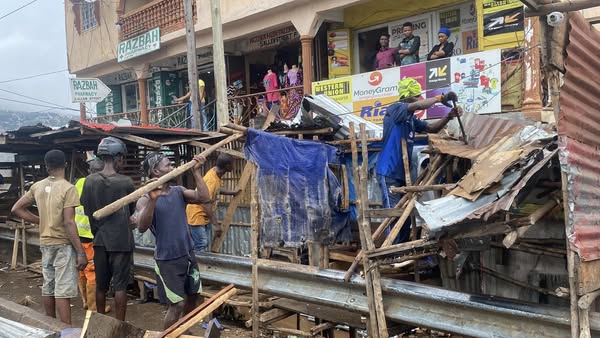By Hassan Osman Kargbo
Dozens of traders at Ferry Junction in the eastern part of Freetown are calling on the Government of Sierra Leone and the Sierra Leone Roads Authority (SLRA) to immediately halt the ongoing demolition of informal market structures that they say are destroying their livelihoods and displacing vulnerable families.
The demolition campaign, part of a broader national effort to clear unauthorized structures and road encroachments, has affected several communities across Eastern Freetown. However, traders say the process lacks proper consultation, notice, or relocation planning, leaving many—especially women, widows, and single parents- without any means of income.
In an exclusive interview with Forum Newspaper, the Chairman of the Ferry Junction Traders Association expressed deep frustration with the government’s approach, saying it contradicts the promises made during the last elections.
“We voted this government for change, but what we are experiencing is suffering,” the chairman said. “Most of us are single parents. We have children to feed and send to school. Now, schools are on holiday, and we were saving up to prepare for reopening. How do we manage now?”
The chairman emphasized that the traders are not against development or road safety measures but are appealing for compassion and structured planning. According to him, many traders have operated in the area for years and consider it their only source of income. “We are not saying don’t develop the roads or make them safer, but at least help us relocate first. Removing us without a plan is cruel, especially given the current economic hardship,” he said.
The SLRA, on the other hand, maintains that the demolition is necessary to improve urban mobility, reduce congestion, and enhance safety for all road users. The agency insists that the operation is a part of its broader mandate to reclaim public road spaces from illegal occupation.
“The essence of this clearing exercise is to enable the free flow of traffic and ensure that bike riders have suitable parking spaces to prevent accidents,” an SLRA representative said. “Road safety is a top priority for the SLRA, and we are implementing stringent measures to keep all citizens safe.”
Despite such justifications, affected traders remain skeptical and deeply concerned about their future. Many claim they were given little or no prior notice and are now left with nowhere to go. Some say they lost their entire stock of goods during the demolition, which has left them financially crippled.
Fatmata Kamara, a widow and vegetable seller at Ferry Junction, described the demolition as a “nightmare.” “I have been selling here for over 10 years. This is what I use to take care of my five children. Now, everything is gone. Nobody told us anything,” she lamented.
Community leaders and other local stakeholders have joined the traders in appealing to President Julius Maada Bio and the central government for urgent intervention. They are urging the government to consider the humanitarian impact of the exercise and to provide alternative spaces or compensation for the displaced vendors.
“We understand the need for better roads, but this must be balanced with the needs of the people,” said another community stakeholder. “Without us, the markets won’t run. Without the markets, people won’t eat. It’s that simple.”
As the demolition exercise continues, tension remains high among affected traders. Many have vowed to remain at the site in peaceful protest until a resolution is found.
The situation underscores a growing tension in urban development across Sierra Leone, where efforts to modernize infrastructure often clash with the realities of poverty and informal economic survival.
The government has yet to issue a formal response to the traders’ plea, but pressure is mounting for authorities to take a more inclusive and compassionate approach.
For now, Ferry Junction remains a flashpoint—where the struggle between progress and survival plays out in real time.










